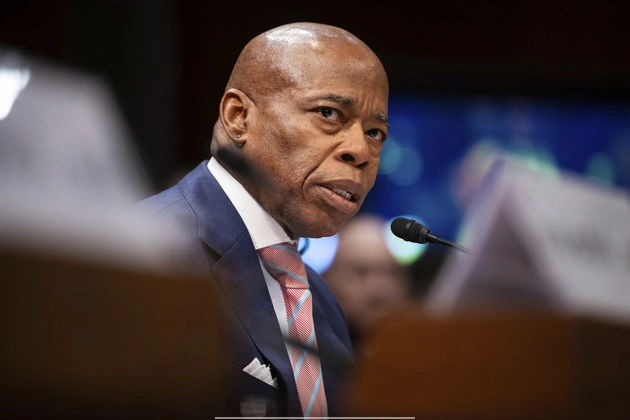
The Legal Battle over Noncitizen Voting Rights in New York City
ALBANY, New York — New York’s top court is set to consider whether documented noncitizens can vote in New York City elections — a legal battle that’s tailor-made to catch the eye of the Oval Office.
The case, which will be argued Tuesday, could significantly reshape the city’s political landscape. Nearly a million potential voters would be allowed to participate in elections like mayoral contests if Democrats prevail.
A Democratic victory would also give plenty of red meat to Republicans.
“It’s hard to discuss because it’s crazy it’s even an issue,” said state Sen. Andrew Lanza, a Staten Island Republican. “Citizens ought to vote; if you’re not a citizen of a country, you should not have a say.”
The legal fight in Albany is the latest front in the political battle over migrants — an issue central to President Donald Trump’s electoral victory last November. Trump and other Republicans have made the unfounded claim that noncitizens are illegally voting in large numbers, and eight states approved constitutional amendments in 2024 explicitly banning their ballots in local contests. But there has also been movement in the other direction. The District of Columbia Council passed a bill allowing noncitizen voting in 2022, and Burlington, Vermont, approved one in 2023.
New York City’s own measure became law in 2022. It would allow green-card holders and individuals with work permits who have lived in the city for at least a month to cast ballots in municipal elections. Republicans quickly challenged the law, and two lower courts have blocked it.
Supporters of the measure have responded that noncitizens have as much a right to determine their city’s future as anybody else.
“In five City Council districts, non-U.S. citizens make up about a third of the adult population,” attorneys for the city’s lawmaking body wrote in a legal filing. “These New Yorkers pay billions in taxes and yet have no say in local policies on public safety, garbage collection, or housing — all matters that affect their day-to-day lives.”
It’s unclear how quickly the law would take effect if the Court of Appeals upholds it. There would likely be only a few months between a decision and the voter registration deadline for the June primary, which might not provide enough runway to implement the change.
A ruling in favor of the law would likely force the city’s political class to overhaul the calculus it applies to local races. In 2021, voters cast 942,000 ballots in the Democratic mayoral primary; in that year’s November general election, 1.1 million people voted.
Most estimates suggest the new law would make an additional 800,000 people eligible to vote. Not all of them would register, but even if a fraction do, that’s still a major expansion of the electorate.
“If we were to allow green-card holders to participate in municipal elections, they will make their voices heard about a mayor and a City Council who will protect them, and who will help keep them safe and create some economic opportunity for our immigrant neighbors,” said state Sen. Jessica Ramos, who’s part of a crowded Democratic field challenging Mayor Eric Adams.
How that impacts the 2025 horse race is difficult to predict: “I don’t know if green-card holders have ever been polled for an election,” Ramos said.
For the measure to go into effect, Democratic attorneys need to convince the court — which is dominated by Democrats. And while that makeup could play in their favor, the court hasn’t always sided with the party on election issues.
Much of the Republican argument challenging the law rests on specific language in the state constitution: “Every citizen shall be entitled to vote at every election for all officers elected by the people and upon all questions submitted to the vote of the people.”
An appellate court ruled last year that the passage means an “irrefutable inference applies that noncitizens were intended to be excluded from those entitled to vote.” The panel of judges decided 3-1 to block the law.
“Anybody who actually applies the laws of this state to the facts will come to the conclusion that the decision of the appellate court should be affirmed,” said Assemblymember Michael Tannousis, one of the Republican plaintiffs.
Supporters of the law have regularly attacked the GOP litigants.
“The lawsuit remains another shameful attempt by xenophobic Republicans who would disenfranchise residents rather than promote a more inclusive and participatory democracy,” the New York Immigration Coalition said after the appellate court issued its decision.
Tannouis disagrees with that take.
“My parents came here for the American dream and became naturalized American citizens,” he said. “Becoming an American citizen is sacred for the individuals that come here to work hard. I do not think that people who do not go through the naturalization process should be allowed to vote or have a voice in our government.”















